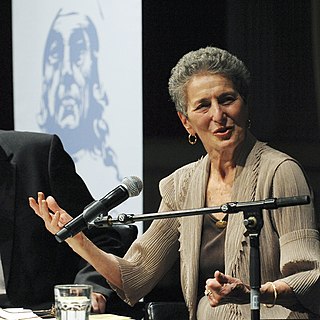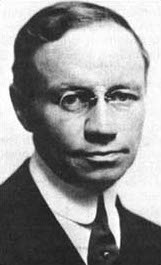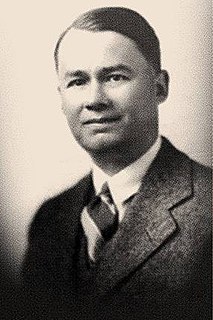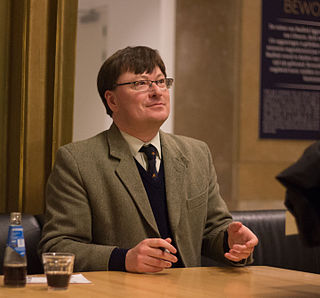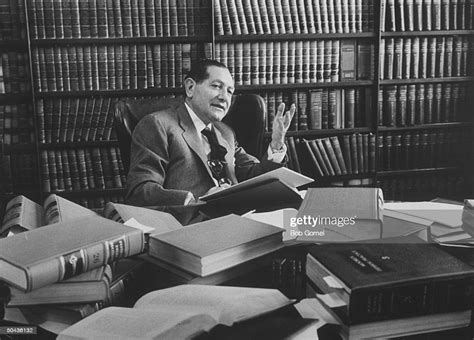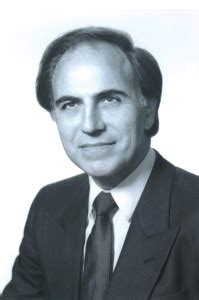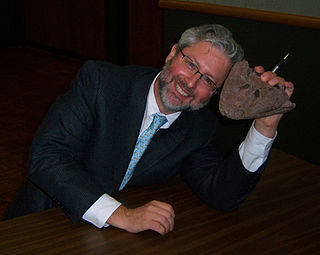Top 1200 Individual Autonomy Quotes & Sayings - Page 16
Explore popular Individual Autonomy quotes.
Last updated on April 21, 2025.
In these sacred documents are embodied eternal principles that no man, group of men, or nation has the right to withhold from others. Here is our basis for freedom of individual achievement. Our Constitution with its Bill of Rights guarantees to all our people the greatest freedom ever enjoyed by the people of any great nation. This system guarantees freedom of individual enterprise, freedom to own property, freedom to start one's own business and to operate it according to one's own judgment so long as the enterprise is honorable.
Carla Hesse has given us an astonishing new look at women's struggle for independent expression and moral autonomy during the French Revolution and afterward. Denied the political and civil rights of men, literary women plunged into the expanded world of publication, answering the men's philosophical treatises with provocative novels about women's choices and chances. Lively and learned, The Other Enlightenment links women from Madame de Stael to Simone de Beauvoir in an alternate and daring path to the modern.
The freedom of an individual depends upon that individual's freedom to alter his considerations of space, energy, time and life and his roles in it. If he cannot change his mind about these, he is then fixed and enslaved amidst barriers such as those of the physical universe, and barriers of his own creation. Man thus is seen to be enslaved by barriers of his own creation. He creates these barriers himself, or by agreeing with things which hold these barriers to be actual.
A “collective” mind does not exist. It is merely the sum of endless numbers of individual minds. If we have an endless number of individual minds who are weak, meek, submissive and impotent – who renounce their creative supremacy for the sake of the “whole” and accept humbly that the “whole’s” verdict – we don’t get a collective super-brain. We get only the weak, meek, submissive and impotent collective mind.
There's another reason why you should love your enemies, and that is because hate distorts the personality of the hater. We usually think of what hate does for the individual hated or the individuals hated or the groups hated. But it is even more tragic, it is even more ruinous and injurious to the individual who hates. [...] For the person who hates, the true becomes false and the false becomes true. That's what hate does.
The concept of need is often looked upon rather unfavorably by economists, in contrast with the concept of demand. Both, however, have their own strengths and weaknesses. The need concept is criticized as being too mechanical, as denying the autonomy and individuality of the human person, and as implying that the human being is a machine which "needs" fuel in the shape of food, engine dope in the shape of medicine, and spare parts provided by the surgeon.
Galen , in the third section of his book, "The Use of the Limbs," says correctly that it would be in vain to expect to see living beings formed of the blood of menstruous women and the semen virile, who will not die, will never feel pain, or will move perpetually, or shine like the sun. This dictum of Galen is part of the following more general proposition: Whatever is formed of matter receives the most perfect form possible in that species of matter; in each individual case the defects are in accordance with that individual matter.
I always worked as an individual artist even when Group Material asked me to join the group. There are certain things that I can do by myself that I would never be able to do with Group Material. First of all, they are a totally democratic entity and although you learn a lot from it, and it's very moving, it's very exacting, everything has to be by consensus, which is the beauty of it, but it is much more work. It's worth it 100%. But as an individual artist there are certain things that I want to bring out and express, and the collaborative practice is not conducive to that.
The majority of men cannot be made disinterested for life by exhortation, by religious services, by any expenditure of subsidized works, or even by grave and manifest public need. They can be made permanently unselfish only by being helped to become disinterested in their individual purposes. In the complete democracy a man must in some way be made to serve the nation in the very act of contributing to his own individual fulfillment. Not until his personal action is dictated by disinterested motives can there be any such harmony between private and public interests.
[T]he individual in whom the will for the light is strong and clear finds his heart inextricably bound up with the struggle of the forces of light in his native place and time. Much as he may long for the opportunity of fuller self- expression in a happier world, he knows that for him self-expression is impossible save in the world in which his mind is rooted. The individual in whom the will for the light is weak soon persuades himself that his opportunity lies elsewhere.
We'd like to just write nothing but lyric poetry. The trouble is, the individual is going along intent on his own personal gratifications and love affairs and financial affairs and everything else. But loping alongside him is this fascist lout who keeps trying to take over. And if you keep ignoring him, he gets bigger and bigger, so every once in a while the free individual has to turn away from his private pursuits and give this fascist lout a few clouts, and beat him down to size.
It is generally admitted that the cultural values (humanization) and the existing institutions and policies of society are rarely,if ever, in harmony. This opinion has found expression in the distinction between culture and civilization, according to which "culture" refers to some higher dimension of human autonomy and fulfillment, while "civilization" designates the realm of necessity, of socially necessary work and behavior, where man is not really himself and in his own element but is subject to heteronomy, to external conditions and needs.
It has become a common feeling, I believe, as we have watched our heroes falling over the years, that our own small stone of activism, which might not seem to measure up to the rugged boulders of heroism we have so admired, is a paltry offering toward the building of an edifice of hope. Many who believe this choose to withhold their offerings out of shame. This is the tragedy of the world. For we can do nothing substantial toward changing our course on the planet, a destructive one, without rousing ourselves, individual by individual, and bringing our small, imperfect stones to the pile.
I am aware that the conclusions arrived at in this work will be denounced by some as highly irreligious; but he who denounces them is bound to show why it is more irreligious to explain the origin of man as a distinct species by descent from some lower from, through the laws of variation and natural selection, than to explain the birth of the individual through the laws of ordinary reproduction. The birth both of the species and of the individual are equally parts of that grand sequence of events, which our minds refuse to accept as the result of blind chance.
The twin sister to autonomy and freedom is responsibility and accountability. You cannot have one with out the other. If someone is given an area of responsibility, not only must they be set free to do it, they must also be held accountable for what they do. Accountability clarifies freedom. In the teams and companies where you see boundary confusion, power struggles, control, over-reaching of one's line of responsibility, you will also see lapses in accountability as well.
I think that everything in the world around us is a reflection of what is going on inside of us. So each of us as an individual creates a life - we draw to us certain people and events and circumstances that reflect what's going on inside of us, so we can literally look at our life and see a mirror of our own consciousness. And if that's true on an individual level, it's also true that what's going on in the world in a bigger way is a reflection of the collective consciousness.
The assumption is that life doesn't need to be navigated with lessons. You can just do it intuitively. After all, you only need to achieve autonomy from your parents, find a moderately satisfying job, form a relationship, perhaps raise some children, watch the onset of mortality in your parents' generation and eventually in your own, until one day a fatal illness starts gnawing at your innards and you calmly go to the grave, shut the coffin and are done with the self-evident business of life.
So I think the Guru can be a delusion. But everything can be deluding. The thing central about the Guru in the West is that he represents an alien principle of the spirit, namely, that you don't follow your own path; you follow a given path. And that's totaly contrary to the Western Spirit! Our spirituality is of the individual quest, individual realization- authenticity in your life out of your own center. So you must take the message of the East, assimilate it to your own dimension and to your own thrust of life, and not get pulled off track.
It is quite clear that as long as the nations of the world spend most of their energy, money, and emotional strength in quarreling with words and weapons, a true offensive against the common problems that threaten human survival is not very likely. A world government that can channel human efforts in the direction of the great solutions seems desirable, even essential. Naturally, such a world government should be a federal one, with regional and local autonomy safeguarded and with cultural diversity promoted.
One of the most insidious consequences of the present burden of personal income tax is that it strips many middle class families of financial reserves & seems to lend support to campaigns for socialized medicine, socialized housing, socialized food, socialized every thing. The personal income tax has made the individual vastly more dependent on the State & more avid for state hand-outs. It has shifted the balance in America from an individual-centered to a State-centered economic & social system.
Each pursues his private interest and only his private interest; and thereby serves the private interests of all, the general interest, without willing it or knowing it. The real point is not that each individual's pursuit of his private interest promotes the totality of private interests, the general interest. One could just as well deduce from this abstract phrase that each individual reciprocally blocks the assertion of the others' interests, so that, instead of a general affirmation, this war of all against all produces a general negation.
The more I do this creative work teaching the "Personal Creativity in Business" course at Stanford the more I realize that business is about people in groups being creative in their own way. If business creativity does not allow individual development, then it isn't sustainable. But if business creativity means people bringing out their best and developing that, then amazing things can happen - not only for the business but also more importantly for the individual and the surrounding community.
The only thing that really matters is that there be an action of goodness, love and intelligence in living. Is goodness individual or collective, is love personal or impersonal, is intelligence yours, mine or somebody else? If it is yours or mine then it is not intelligence, or love, or goodness. If goodness is an affair of the individual or of the collective, according to one's particular preference or decision, then it is no longer goodness.
Nevertheless, it is necessary to remember that a planned economy is not yet socialism. A planned economy as such may be accompanied by the complete enslavement of the individual. The achievement of socialism requires the solution of some extremely difficult socio-political problems: how is it possible, in view of the far-reaching centralisation of political and economic power, to prevent bureaucracy from becoming all-powerful and overweening? How can the rights of the individual be protected and therewith a democratic counterweight to the power of bureaucracy be assured?
It is a great honor for me to be compared to Henri Cartier-BressonBut I believe there is a very big difference in the way we put ourselves inside the stories we photograph. He always strove for the decisive moment as being the most important. I always work for a group of pictures, to tell a story. If you ask which picture in a story I like most, it is impossible for me to tell you this. I don't work for an individual picture. If I must select one individual picture for a client, it is very difficult for me.
To me it seems pretty obvious that it would be simple to build a business around helping people achieve autonomy, a feeling of competence and relatedness. In fact, every web company that has been successful thusfar has their business build solidly on one or all of these. And I believe that as people discover that these things are within their reach, they will gravitate more and more towards companies that offer tools to helping them achieve happiness.
At Rome there were nothing even vaguely resembling modern political parties - although given the stifling impact of these, this may well have made it more rather than less democratic than many countries today - and each candidate for office competed as an individual. Only rarely did they advocate specific policies, although commenting on issues of current importance was more common. In the main voters looked more for a capable individual who once elected could do whatever the State required.
Yes, I spent two long years, traveling all over the United States, all over Europe, interviewing many, many, many people who had been thrown out of their academic jobs because they taught that there was a possibility of life coming from something other than Darwinism, who thought that possibly random selection and mutations didn't account for the universe, didn't account for gravity, didn't account for why nobody had ever seen an individual species evolve - no one's ever seen an individual species evolve!
In the US, voters cast ballots for individual candidates who are not bound to any party program except rhetorically, and not always then. Some Republicans are more liberal than some Democrats, some libertarians are more radical than some socialists, and many local candidates run without any party identification. No American citizen can vote intelligently without knowledge of the ideas, political background, and commitments of each individual candidate.
I concluded some time ago that a major part of success of a team, or of an individual, has a great deal to do with the intangible qualities possessed. The real key is in how a person see himself (humility), how he feels about what he does (passion), how he works with others (unity), how he makes others better (servanthood), and how he deals with frustration and success, truly learning from each situations (thankfulness). I believe those concepts are the essence of a good player, team, coach, or individual in any capacity in life.
We never try to convert those who receive (aid) to Christianity but in our work we bear witness to the love of God's presence and if Catholics, Protestants, Buddhists, or agnostics become for this better men - simply better - we will be satisfied. It matters to the individual what church he belongs to. If that individual thinks and believes that this is the only way to God for her or him, this is the way God comes into their life - his life. If he does not know any other way and if he has no doubt so that he does not need to search then this is his way to salvation.
Consider a movie: it consists of thousands upon thousands of individual pictures, and each of them makes sense and carries a meaning, yet the meaning of the whole film cannot be seen before its last sequence is shown. However, we cannot understand the whole film without having first understood each of its components, each of the individual pictures. Isn't it the same with life? Doesn't the final meaning of life, too, reveal itself, it at all, only at its end, on the verge of death?
Many people with different backgrounds, cultures, languages, and creeds combine to make a nation. But that nation is greater than the sum total of the individual skills and talents of its people. Something more grows out of their unity than can be calculated by adding the assets of individual contributions. That intangible additional quantity is often due to the differences which make the texture of the nation rich. Therefore, we must never wipe out or deride the differences amongst us-for where there is no difference, there is only indifference.
The Peña Nieto government is not going to investigate itself; there's no true autonomy in the investigative and justice branches of the government in Mexico. The recent Mexican crimes and scandals, is profoundly structural, and you'd have to change the way Mexico is run, create a truly independent special prosecutor's office, to even have a chance to get close to achieving justice. People, including the families and many others throughout Mexican society, aren't going to give up in fighting for just that kind of change.
MORAL LAW, Evidence of.- Man has been subjected by his Creator to the moral law, of which his feelings, or conscience as it is sometimes called, are the evidence with which his Creator has furnished him. ... The moral duties which exist between individual and individual in a state of nature, accompany them into a state of society ... their Maker not having released them from those duties on their forming themselves into a nation.
The Socratic maxim that the recognition of our ignorance is the beginning of wisdom has profound significance for our understanding of society. Most of the advantages of social life, especially in the more advanced forms that we call "civilization" rest on the fact that the individual benefits from more knowledge than he is aware of. It might be said that civilization begins when the individual in the pursuit of his ends can make use of more knowledge than he has himself acquired and when he can transcend the boundaries of his ignorance by profiting from knowledge he does not himself possess.
Right now in the insurance markets, we have sort of a disaster unfolding, a downward spiral, adverse selection, premiums in the individual market going through the roof. People can't afford insurance and insurance companies are losing hundreds of millions of dollars. If you repeal part of Obamacare to get rid of the individual mandate but keep some of the ideas, that people can still buy insurance after they're sick, the situation gets extraordinarily worse. And so what we're seeing now could be tenfold greater if you only repeal part of Obamacare.
It's a peculiar thing about liberals. When it comes to middle-class people who are fully capable of caring for themselves, liberals seek to undermine their independence in every way possible. With seductive 'entitlements' like guaranteed retirement, health care, nutrition, education, and jobs, liberals attempt to lure the middle class into dependence on the state. But when it comes to those who are truly incompetent, those whose mental afflictions render them unable to manage their lives at all, liberals are suddenly transformed into absolutists for personal autonomy.
In talking about human rights today, we are referring primarily to the following demands: protection of the individual against arbitrary infringement by other individuals or by the government; the right to work and to adequate earnings from work; freedom of discussion and teaching; adequate participation of the individual in the formation of his government. These human rights are nowadays recognised theoretically, although, by abundant use of formalistic, legal manoeuvres, they are being violated to a much greater extent than even a generation ago.
Magnetic current is the same as electric current. Current is [actually] the wrong expression. Really it is not one current, they are two currents, one current is composed of North Pole individual magnets in concentrated streams and the other is composed of South Pole individual magnets in concentrated streams, and they are are running one stream against the other stream in whirling, screwlike fashion, and with high speed.
Where these reduced (operational - E.W.) concepts govern the analysis of the human reality, individual or social, mental or material, they arrive at a false concreteness - a concreteness isolated from the conditions which constitute its reality. In this context, the operational treatment of the concept assumes a political function. The individual and his behavior are analyzed in a therapeutic sense - adjustment to his society. Thought and expression, theory and practice are to be brought in line with the facts of his existence without leaving room for the conceptual critique of these facts.
There are two visions of America. One precedes our founding fathers and finds its roots in the harshness of our Puritan past. It is very suspicious of freedom, uncomfortable with diversity hostile to science, unfriendly to reason, contemptuous of personal autonomy. It sees America as a religious nation. It views patriotism as allegiance to God. It secretly adores coercion and conformity. Despite our constitution, despite the legacy of the Enlightenment, it appeals to millions of Americans and threatens our freedom.
When the finely tuned balance among the different parts of bodies breaks down, the individual creature can die. A cancerous tumor, for example, is born when one batch of cells no longer cooperates with others. By dividing endlessly, or by failing to die properly, these cells can destroy the necessary balance that makes a living individual person. Cancers break the rules that allow cells to cooperate with one another. Like bullies who break cooperative societies, cancers behave in their own best interest until they kill their larger community, the human body.
Mother is in herself a concrete denial of the idea of sexual pleasure since her sexuality has been placed at the service of reproductive function alone. She is the perpetually violated passive principle; her autonomy has been sufficiently eroded by the presence within her of the embryo she brought to term. Her unthinking ability to reproduce, which is her pride, is, since it is beyond choice, not a specific virtue of her own.
The results of life are uncalculated and uncalculable. The years teach much which the days never know. The persons who compose our company, converse, and come and go, and design and execute many things, and somewhat comes of it all, but an unlooked for result. The individual is always mistaken. He designed many things, and drew in other persons as coadjutors, quarrelled with some or all, blundered much, and something is done; all are a little advanced, but the individual is always mistaken. It turns out somewhat new, and very unlike what he promised himself.
Reason cannot desire for man any condition other than that in which not only every individual enjoys the most absolute, unbounded freedom to develop himself out of himself, in true individuality, but in which physical nature, as well, need receive no other shaping by human hands than that which is given to her voluntarily by each individual, according to the measure of his wants and his inclinations, restricted only by the limits of his energy and his rights.
Their [BBC] idea of bipartisanship is to try not to offend the Conservative party, try not to offend the Labour party.There is no analysis of anything beyond that, and these two parties are exactly identical, following the same Neoliberal policies for thirty years. And it's no criticism outside of that, it's just that there's basically sectarian pandering to these two individual parties, these two individual organisations. They still make a lot of great programmes and do a lot of great things, but there's not much political analysis happening broader to that.
There are plenty of teams in every sport that have great players and never win titles. Most of the time, those players aren't willing to sacrifice for the greater good of the team. The funny thing is, in the end, their unwillingness to sacrifice only makes individual goals more difficult to achieve. One thing I believe to the fullest is that if you think and achieve as a team, the individual accolades will take care of themselves. Talent wins games, but teamwork and intelligence win championships.
The whole point about vision is that it's very individual, it's very personal, and it has to be confessional. It has to be something which hurts - the pulling out of it and putting it on the page hurts. Art can be about the individual writer's response to his or her condition, and if that response comes out of a predigested belief about what the audience wants to hear about the writer's condition, then it has no truth, it has no validity. You either write with your own blood or nobody's. Otherwise it's just ink.
The main joy I have in owning or being a part of my own label is the platform I've created to really push other artists and this other kind of musical muscle I get to exercise, it's not just me as a creator of music but me as a curator. That's been really exciting and I do get to have the autonomy and control and all those things with my releases, but now I get to go and find artists that I really love and like and share them with the world too.
Among other grand achievements, F. A. Hayek had a remarkable career pointing out the flaws in collectivism. One of his keenest insights was that, paradoxically, any collectivist system necessarily depends on one individual (or small group) to make key social and economic decisions. In contrast, a system based on individualism takes advantage of the aggregate, or 'collective,' information of the whole society; through his actions each participant contributes his own particular, if incomplete, knowledge-information that could never be tapped by the individual at the head of a collectivist state.

